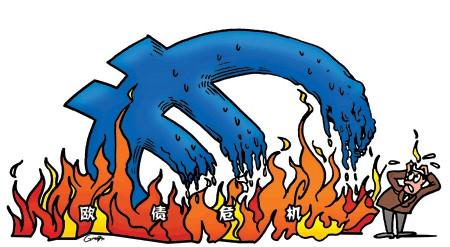(Ecns.cn)--The euro is on the verge of collapse. The euro zone is struggling to find a way to 'walk out' of the crisis. Eyes turn towards China in the hope that it can take enough cash out of its rich foreign-exchange reserves to save the day.
On the one hand, why not? From an economic perspective, the EU means a lot to China. It's the country's No.1 trading partner and export market, its primary source of technology imports, and its third largest source of foreign capital, reports Life Week. If the euro crashed, China's economy would waver in the winds that followed.
EU, the largest exporting market
Ten more European countries are joining the EU, including Poland and Hungary. This expanding zone was already China's largest trading market by 2004, overtaking Japan's spot that year. The euro zone's imports from China keep growing while trade done with other countries diminishes in comparison. This July, China replaced the US as the EU's top trading partner, making China and the EU each other's No.1 trading partner.
China export value to the EU took a great leap in just one decade, soaring to US$ 312 billion in 2010, 20 percent of its total exports. Looking back to 2000, exports to the EU amounted to only US$ 38 billion.
Despite criticism of the Sino-EU trading model as "8m shirts exchanged for one airplane", it is an important driver in China's economy. Of more importance, Europe's great demand for made-in-China goods supports China's labor-intensive industries and indirectly ensures that employment rates in its massive population stay high.
European imports, better life
Importing from Europe is also important to China. An ordinary consumer here sees that the more import products are imported, the more choice is available. Chinese products reduce the average European's cost of living, and European products improve the quality of life for Chinese.
Since the reform and opening up policy in 1978, China has constantly introduced technologies from Europe. Some 35,459 technologies had been imported by the end of 2010, with a total contract value of US$ 135 billion, almost half of China's total technology imports.
Germany, France, the U.K., Italy and the Netherlands are China's top five technology sources, and China's railway transportation, electronic equipment and new energy sectors are major contributors to these technology imports.
Investing in each other
Statistics describing the last two years of activity show the euro zone is the third largest source of foreign capital entering China's market after the Hong Kong and Taiwan regions, reports Life Week.
In the grim context of a global economy on the slide, China's market maintains high profit margins, so no wonder that many international companies are looking more carefully and respectfully at China than they used to. An increasing number of European companies are beginning by establishing research and development centers here.
For similar reasons, the euro zone has become an important destination for Chinese enterprises in recent years. According to data from the Ministry of Commerce, China's direct investment in the EU totaled almost US$ 6 million in 2010.
The euro debt crisis may involve Chinese enterprises in more mergers and acquisitions too. Chinese enterprises contribute to maintaining employment in the euro zone; about 37,700 jobs were created there by the end of 2010.
Bargain to lift arms embargo?
Considering what's at stake, it is widely assumed China will negotiate with the EU to exchange their life-saving cash reserves for market-economy status. Withholding this status has provided a convenient reason for both the US and the EU to launch antidumping cases against China.
But some experts argue getting China its much-coveted market-economy status is not worth picking up Europe's bill in these tough times. According to the rules of the WTO, China will automatically get market-economy status in 2016 anyway.
If the market-economy prize is not a convincing reason for China to redirect its funds, what return could China possibly look forward to for its generosity? Another guess centers on the issue of the EU arms embargo on China that has lasted for over two decades.
Catherine Ashton, the EU High Representative for Foreign Affairs and Security Policy, pushed for an end to the arms embargo on China in the beginning of 2011, but failed. Maybe the EU will be more open-minded about approaching this political milestone while it is under pressure to diffuse the more immediate threat to its health - financial collapse.
But if we compare the EU to a company, it appears China can, at best, act as an outside financial investor. An infusion of cash may help the 'company' ease itself through a crisis, but an act of Chinese heroism cannot resolve the region's essentially deeper problems. Only the EU members, especially the key shareholders, have the power to bring about reform in the system that produced the crisis.


















